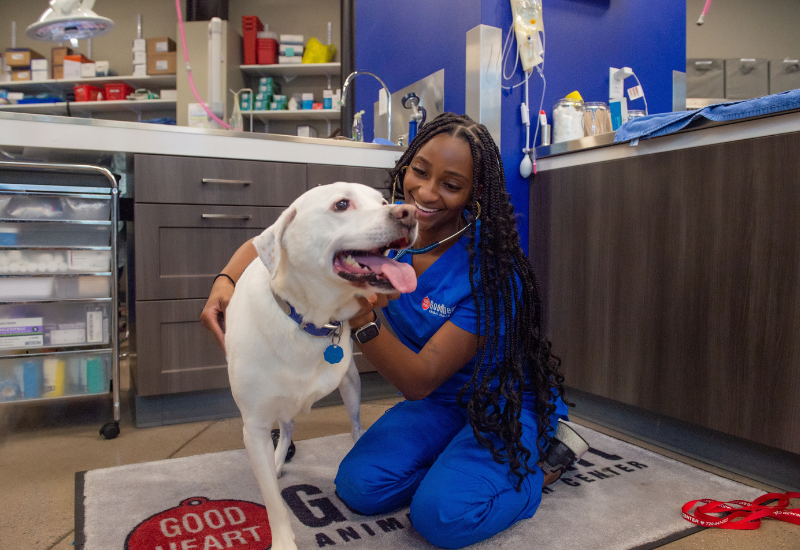Taking a trip with Your Pets: Tips for a Stress-Free Journey
Wiki Article
Comprehending Your Animals' Nutritional Requirements for Ideal Health And Wellbeing

Relevance of Well Balanced Diet Plans
Making sure a well balanced diet plan for pet dogs is important for their general wellness and well-being. Pet dogs, like human beings, need a blend of healthy proteins, carbohydrates, fats, vitamins, and minerals to preserve ideal wellness.Integrating a range of nutrients makes certain that pets preserve a durable body immune system, healthy and balanced skin, and a glossy layer. A well balanced diet regimen can protect against a host of wellness concerns such as weight problems, which is connected to diabetes mellitus and joint troubles, or lack of nutrition, which can lead to developmental hold-ups and body organ dysfunction.
Pet owners should bear in mind portion sizes and caloric consumption, as overfeeding or underfeeding can have significant effects. Consulting with veterinarians or pet dog nutritionists can help customize diet plans to satisfy particular needs, making sure that pet dogs receive the appropriate equilibrium of nutrients needed for their size, task, and age degree. A balanced and consistent diet plan is vital for a pet's long life and happiness.
Species-Specific Nutritional Needs
How do different varieties of animals have varying dietary needs? This question highlights the need for a tailored approach to feeding our pet buddies. Each varieties possesses unique metabolic pathways, digestive system systems, and nutritional demands that need to be fulfilled for optimal wellness. For example, canines are omnivores, requiring a well balanced diet plan of fats, carbs, and proteins, while pet cats, as obligate carnivores, need a higher healthy protein consumption obtained largely from animal sources.Birds, depending on their species, may need a diet plan abundant in seeds, fruits, or insects, emphasizing the variety within the bird globe. Pets. Reptiles, such as snakes and turtles, likewise demand species-specific diet plans, with some requiring high degrees of calcium and others, a well-calibrated balance of insects and plant issue
Failure to provide species-appropriate nutrition can lead to deficiencies or extras, impairing health and wellness and long life. For instance, feeding a feline canine food could lead to taurine deficiency, bring about extreme health and wellness problems such as heart problem. As a result, comprehending the dietary differences amongst different species is crucial for family pet owners. By catering and recognizing to these distinctions, we make certain the arrangement of appropriate nutrition, sustaining the total wellbeing and vitality of our pet dogs.
Age and Size Considerations
While species-specific nutritional requirements lay the structure for an animal's size, age and diet plan more fine-tune these demands. Young animals, such as kittycats and young puppies, call for diets rich in calories, proteins, and important nutrients to sustain quick growth and development. These young creatures have greater metabolic prices and need more frequent feedings to maintain their energy degrees check and make certain proper growth of body organs, muscle mass, and bones.Formulas made for grown-up animals frequently concentrate on maintaining weight, advertising digestive system wellness, and sustaining an active way of life. Alternatively, senior family pets might benefit from specialized diet plans that address age-related obstacles, such as joint health and wellness, cognitive function, and body organ assistance.

Health And Wellness Issues and Dietary Adjustments
Certain wellness conditions can significantly influence the nutritional requirements of pet dogs, requiring tailored dietary adjustments to support their wellness. For instance, pet dogs with diabetic issues might gain from diets that are high in fiber and reduced in simple carbs to help control blood sugar level degrees. Overweight animals commonly call for reduced-calorie diet regimens to promote weight loss and stop affiliated wellness issues.Pets with renal condition may need diets low in phosphorus and protein to relieve kidney work. Omega-3 fatty acids, known for their anti-inflammatory properties, can be helpful for pets suffering from conditions like arthritis or inflammatory digestive tract illness. Furthermore, pet dogs with food allergic reactions or intolerances might require hypoallergenic diet plans, usually requiring a procedure of elimination to identify and exclude offending ingredients.
Vet guidance is crucial when making dietary adjustments, as inaccurate nourishment can aggravate existing illness or lead to new ones. Regular monitoring and adjustments based upon the pet's reaction to dietary changes are essential. A balanced method, thinking about both dietary and medical needs, ensures that nutritional interventions contribute positively to managing wellness conditions, improving not only the pet dog's health and wellness but also their top quality of life.
Tips for Choosing Top Quality Pet Dog Food
Picking the right family pet food is critical for ensuring your family pet's health and long life. A balanced diet plan supports their immune system, keeps healthy weight and advertises overall vigor. Begin by consulting your veterinarian to understand your family pet's details dietary needs based upon age, breed, and wellness status.When assessing pet dog food, scrutinize the ingredient listing. Top notch pet dog foods commonly note genuine meat, chicken, or fish as the main component.
Inspect for the Organization of American Feed Control Officials (AAFCO) declaration on the product packaging. This shows the food fulfills recognized nutritional criteria. In addition, research study the supplier's online reputation. Brand names with a background of recalls or bad top quality control need to be come close to with care.
Think about whether your pet dog would certainly gain from special formulas such as grain-free, high-protein, or limited-ingredient diet regimens. These can be valuable for family pets with allergies or specific wellness problems. Finally, observe your animal's response look at here to the food. Screen their coat problem, energy levels, and digestion to guarantee the diet is effective.
Final Thought
why not try here An extensive understanding of pet dogs' dietary demands is vital for promoting their optimal health and wellbeing. By sticking to these concepts, pet owners can dramatically add to their pet dogs' development, energy levels, and overall health and wellness, fostering a better and much healthier life.
Picking the best pet food is essential for guaranteeing your pet's wellness and longevity. By adhering to these concepts, animal owners can significantly add to their animals' growth, energy levels, and overall health and wellness, promoting a happier and healthier life.
Report this wiki page